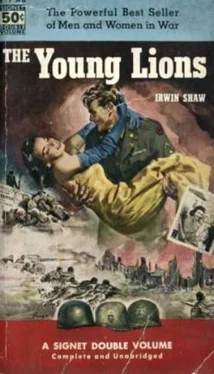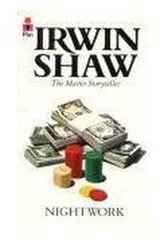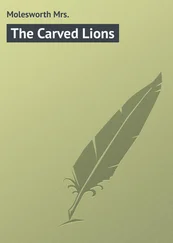Irwin Shaw - The Young Lions
Здесь есть возможность читать онлайн «Irwin Shaw - The Young Lions» весь текст электронной книги совершенно бесплатно (целиком полную версию без сокращений). В некоторых случаях можно слушать аудио, скачать через торрент в формате fb2 и присутствует краткое содержание. Жанр: Классическая проза, на английском языке. Описание произведения, (предисловие) а так же отзывы посетителей доступны на портале библиотеки ЛибКат.
- Название:The Young Lions
- Автор:
- Жанр:
- Год:неизвестен
- ISBN:нет данных
- Рейтинг книги:4 / 5. Голосов: 1
-
Избранное:Добавить в избранное
- Отзывы:
-
Ваша оценка:
- 80
- 1
- 2
- 3
- 4
- 5
The Young Lions: краткое содержание, описание и аннотация
Предлагаем к чтению аннотацию, описание, краткое содержание или предисловие (зависит от того, что написал сам автор книги «The Young Lions»). Если вы не нашли необходимую информацию о книге — напишите в комментариях, мы постараемся отыскать её.
The Young Lions — читать онлайн бесплатно полную книгу (весь текст) целиком
Ниже представлен текст книги, разбитый по страницам. Система сохранения места последней прочитанной страницы, позволяет с удобством читать онлайн бесплатно книгу «The Young Lions», без необходимости каждый раз заново искать на чём Вы остановились. Поставьте закладку, и сможете в любой момент перейти на страницу, на которой закончили чтение.
Интервал:
Закладка:
The picture faded out on a close-up of the handsome young Lieutenant smiling tenderly and thoughtfully at his collected men as the train sped west, and there was real applause from the soldiers in the hall.
The newsreel came on. There were pictures of Hitler talking and the Luftwaffe dropping bombs on London and Goering pinning a medal on a pilot who had downed a hundred planes, and infantry advancing against a burning farm building on the road to Leningrad.
One of the men on the screen fell. It was hard to tell whether he was taking cover or had been hit, but he didn't get up, and the camera passed over him. Christian felt his eyes growing wet. He was a little ashamed of himself for it, but every time he saw these films of Germans fighting, while he sat safe and comfortable so far away, he had to curb a tendency to cry. And he always felt guilty and uneasy and was sharp-tempered with his men for days afterwards. It wasn't his fault that he was alive while others were dying. The Army performed its intricate functions in its own way, but he couldn't fight off the sense of guilt. And even the thought of going home for two weeks was flavoured by it. Young Frederick Langerman had lost a leg in Latvia and both sons of the Kochs had been killed and it would be impossible to avoid the measuring, contemptuous stares of his neighbours when he came back, well-fed and whole, with one half-hour of semi-comic combat outside Paris behind him.
The war, he thought, had to end soon. Suddenly his civilian life, the easy-going, thoughtless days on the snowy slopes, the days without Lieutenant Hardenburg, seemed unbearably sweet and desirable. Well, the Russians were about to cash in, and then the British would finally see the light, and he would forget those boring, silly days in France. Two months after it was over people would stop talking about the war, and a clerk who added figures in the quartermaster's office in Berlin for three years would get as much respect as a man who had stormed pillboxes in Poland, Belgium and Russia. Then, Hardenburg might show up some day, still a Lieutenant… or even better, discharged as unnecessary. And Christian could go off alone in the hills and… He smiled sourly as he recognized the recurrent, childish dream. How long, he wondered, would they be likely to keep him in after the armistice was signed? Those would be the really difficult months, when the war was over and you were just waiting for the slow, enormous machinery of the Army's bureaucracy to release you.
The lights went up and Christian moved slowly out among the crowd of soldiers. They all looked middle-aged, Christian thought bitterly, and like men who suffered from frailty and disease. Garrison troops, contemptuously left in a peaceful country while the better specimens of German manhood were out fighting the nation's battles thousands of miles away. And he was one of them. He shook his head irritably. He'd better stop this or he'd get as bad as Hardenburg.
There were still some French men and women on the dark streets and they hastily stepped down into the gutter as he approached. He was annoyed at them, too. Timidity was one of the most irritating qualities in the human character. And it was a more or less needless and unfounded timidity, which was worse. He wasn't going to hurt them and the entire Army was under the strictest orders to behave correctly and with the utmost politeness to the French. Germans, he thought, as a man stumbled a little stepping down from the kerb, Germans would never behave like that if there were a foreign army in Germany. Any foreign army.
He looked at his watch. He still had twenty minutes before having to report to the orderly room. There was a cafe open across the street and he suddenly needed a drink.
He opened the door. There were four soldiers drinking champagne at a table. They were red-faced and they had obviously been drinking a long time. They had their tunics unbuttoned and two of them needed a shave. Champagne, too. Certainly not on a private's pay. Probably they were selling stolen German Army weapons to the French. The French weren't using them, of course, but there was no telling what might happen finally. Even the French might regain their courage. An army of blackmarket merchants, Christian thought bitterly, dealers in leather and ammunition and Normandy cheese and wine and veal. Leave them in France another two years and you wouldn't be able to distinguish them from the French except by their uniforms. The subtle, shabby victory of the Gallic spirit.
"A vermouth," Christian said to the proprietor, who was standing nervously behind the bar. "No, a brandy."
He leaned against the bar and stared at the four soldiers. The champagne was probably awful. Brandt had told him the French put any kind of label on any kind of miserable wine. The Germans didn't know better, and it was the French way of fighting back, patriotism mixed, of course, with profit. The four soldiers noticed Christian watching them. They became a little self-conscious and lowered their voices as they drank. Christian saw one of the men rub his hand guiltily across his unshaven cheek. The proprietor put the brandy down in front of Christian and he sipped at it, staring stonily at the four soldiers. One of the men took out his wallet to pay for a new bottle of champagne and Christian saw that it was bulging carelessly with francs. God, was it for these soft, conniving gangsters that Germans were hurling themselves against the Russian lines? Was it for these flabby shopkeepers that the Luftwaffe was burning over London?
"You," Christian said, to the man with the wallet. "Come over here!"
The man with the wallet looked at his comrades thoughtfully. They were very quiet and they stared down into their glasses. The man with the wallet stood up slowly and stuffed his money away in a pocket.
"Move!" Christian said fiercely. "Get over here."
The soldier shuffled over to Christian, his face growing pale under his stubble.
"Stand up!" Christian said. "Stand at attention!" The man stiffened, looking more frightened than ever.
"What's your name?" Christian snapped.
"Private Hans Reuter, Sergeant," the man said, in a low, nervous voice.
Christian took out a pencil and a slip of paper and wrote the name down. "Unit?" he asked.
The soldier swallowed unhappily. "147th Battalion of Pioneers," he said.
Christian wrote that down. "The next time you go out to drink, Private Reuter," he said, "you will shave and keep your tunic buttoned. You will also stand at attention when addressing your superiors. I'm submitting your name for disciplinary action."
"Yes, Sergeant."
"Dismissed."
Reuter sighed and turned back to his table.
"All of you," Christian called bitingly, "dress like soldiers!" The men buttoned their tunics. They sat in silence. Christian turned his back on them and stared at the proprietor.
"Another brandy, Sergeant?"
"No."
Christian put some money on the bar for the drink, finished the brandy. He stalked out without looking at the four soldiers sitting in the corner.
Lieutenant Hardenburg was sitting in the orderly room with his cap and gloves on. He sat erect, as though he was on a horse, staring across the room at the Propaganda Ministry's map of Russia, with the battle lines, as of last Tuesday, drawn on it in victorious black and red strokes. The orderly room was in an old French police building, and there was a smell of ancient small crimes and unwashed French policemen that all the brisk cleanliness of the German Army had failed to eradicate. A single small bulb burned overhead and it was hot because the windows and blinds were closed for the blackout and the ghosts of all the petty criminals who had been in the room seemed to be hovering in the stale air.
When Christian came into the room, a little, greasy man in the uniform of the French Milice was standing uneasily near the window, occasionally glancing at Hardenburg. Christian stood at attention and saluted, thinking: This cannot go on for ever, this will end some day.
Читать дальшеИнтервал:
Закладка:
Похожие книги на «The Young Lions»
Представляем Вашему вниманию похожие книги на «The Young Lions» списком для выбора. Мы отобрали схожую по названию и смыслу литературу в надежде предоставить читателям больше вариантов отыскать новые, интересные, ещё непрочитанные произведения.
Обсуждение, отзывы о книге «The Young Lions» и просто собственные мнения читателей. Оставьте ваши комментарии, напишите, что Вы думаете о произведении, его смысле или главных героях. Укажите что конкретно понравилось, а что нет, и почему Вы так считаете.











